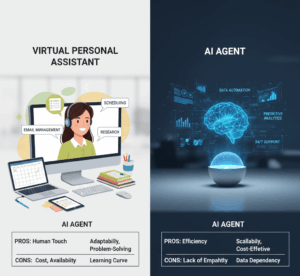Personal Assistant vs. Administrative Assistant: Understanding the Differences
Did you know that hiring the right support professional can boost productivity by up to 20%? Whether you’re an executive needing personalised assistance or a business seeking streamlined office operations, choosing between a Personal Assistant (PA) and an Administrative Assistant (AA) can make all the difference. This guide explores their roles, skills, and environments to help you make an informed decision.
Key Areas We Will Cover
- Definitions and core responsibilities of Personal Assistants and Administrative Assistants
- Key differences in focus, work environment, and skill sets
- Training, education, and tools required for each role
- Real-world scenarios illustrating how PAs and AAs operate
- How to choose the right role for your business or career
- StaffNow’s expert staffing solutions for hiring top talent
Introduction
In today’s fast-paced world, efficient support staff are the backbone of successful individuals and organisations. The terms Personal Assistant and Administrative Assistant are often used interchangeably, but their roles, responsibilities, and work environments differ significantly. Understanding these distinctions is essential for hiring managers, business owners, and job seekers. This article provides a comprehensive comparison of Personal Assistants and Administrative Assistants, highlighting their unique contributions and how they can meet your specific needs.
What Is a Personal Assistant?
A Personal Assistant (PA) provides tailored support to an individual, managing both personal and professional tasks to ensure their daily life runs smoothly. PAs often work for high-profile individuals, such as executives, entrepreneurs, or celebrities, and their role is highly flexible.
Key Responsibilities
- Scheduling personal and professional appointments
- Arranging travel, including flights, accommodations, and itineraries
- Running errands, such as shopping or coordinating household services
- Managing personal finances, such as budgeting or bill payments
- Handling confidential correspondence with discretion
Work Environment
PAs often work in private homes, remotely, or on the go, depending on the employer’s needs. They may travel with their employer or work flexible hours to accommodate varying schedules.
Real-World Scenario
Imagine a busy entrepreneur preparing for an international conference. Their PA books flights, coordinates a packed schedule of meetings, and ensures personal commitments, like family events, are seamlessly integrated. This level of personalised support allows the entrepreneur to focus on their business goals.
What Is an Administrative Assistant?
An Administrative Assistant (AA) supports the smooth operation of an organisation by handling administrative tasks. AAs are typically found in corporate environments, government offices, or small businesses, where they ensure office efficiency.
Key Responsibilities
- Managing office calendars and scheduling meetings
- Handling phone calls, emails, and client inquiries
- Organising and maintaining filing systems
- Preparing reports, presentations, or correspondence
- Overseeing office supplies and basic bookkeeping
Work Environment
AAs usually work in structured office settings with regular business hours. With the rise of remote work, many AAs now operate virtually, supporting teams through digital platforms.
Real-World Scenario
In a mid-sized corporate office, an AA coordinates a team’s weekly meetings, maintains client databases, and ensures all documents are filed accurately. Their work keeps the office running like a well-oiled machine, supporting multiple stakeholders.
Key Differences Between Personal Assistants and Administrative Assistants
While both roles involve organisational tasks, their focus and execution differ significantly. Below is a detailed comparison:
Feature | Personal Assistant (PA) | Administrative Assistant (AA) |
Focus | Personal tasks for an individual | Administrative tasks for an organisation |
Work Environment | Private homes, remote, or on-the-go | Office settings or virtual offices |
Level of Responsibility | Entry-level; handles sensitive personal information | Entry to mid-level; manages office operations |
Skills Required | Organisational skills, discretion, adaptability | Technical proficiency, attention to detail, communication |
Average Salary (2025) | £40,026 per year | £40,751 per year |
Salary Insight
According to recent UK data, Personal Assistants earn an average of £40,026 annually, while Administrative Assistants earn slightly more at £40,751, reflecting their broader organisational responsibilities (source: industry salary surveys, 2025).
Skills and Qualifications for Success
Both roles demand distinct skill sets and tools to excel in their respective environments.
Personal Assistants
- Organisational Skills: Juggling multiple tasks, from scheduling to travel planning, with precision.
- Discretion: Handling sensitive personal or financial information with utmost confidentiality.
- Adaptability: Adjusting to the employer’s changing needs and schedules.
- Tools: Calendar apps (e.g., Google Calendar), travel platforms (e.g., TripIt), and communication tools (e.g., WhatsApp).
- Education: No formal degree required; certifications in personal organisation or project management are beneficial.
Administrative Assistants
- Technical Proficiency: Expertise in office software like Microsoft Office, Google Workspace, or CRM tools (e.g., Salesforce).
- Attention to Detail: Ensuring accuracy in documents, reports, and correspondence.
- Communication Skills: Interacting with clients, vendors, and team members effectively.
- Tools: Document management systems (e.g., DocuSign), collaboration platforms (e.g., Slack), and office suites.
- Education: Business administration courses or certifications like Certified Administrative Professional (CAP) enhance employability.
Evolving Roles in a Remote Work Era
The rise of remote and hybrid work has transformed both roles. Personal Assistants now use virtual tools to manage schedules and coordinate tasks from anywhere, while Administrative Assistants leverage platforms like Zoom and Microsoft Teams to support distributed teams. This shift has increased demand for tech-savvy professionals who can adapt to digital workflows.
Benefits of Remote PAs and AAs
- Flexibility: Remote assistants can work across time zones, offering greater scheduling freedom.
- Cost Savings: Businesses save on office space, while individuals reduce commuting costs.
- Productivity: Digital tools streamline tasks, from document sharing to virtual meeting coordination.
Choosing the Right Role for Your Needs
Deciding between a Personal Assistant and an Administrative Assistant depends on your priorities:
- Hire a Personal Assistant if: You’re an individual needing personalised support, such as an entrepreneur or executive balancing personal and professional commitments.
- Hire an Administrative Assistant if: Your business requires structured office support to manage operations, client interactions, or team coordination.
- For Job Seekers: Align your skills with the role that suits you. If you thrive in dynamic, flexible environments, a PA role may be ideal. If you prefer structured tasks and technical proficiency, consider an AA position.
Why StaffNow Is Your Partner for Hiring Support Staff
At StaffNow, we specialise in connecting businesses and individuals with top-tier Personal Assistants and Administrative Assistants. Our rigorous vetting process ensures you get candidates with the right skills and experience.
Why Choose StaffNow?
- Access Top Talent: Our pool includes highly qualified PAs and AAs with expertise across industries.
- Flexible Solutions: Hire professionals for 10 to 40 hours per week, tailored to your needs.
- Seamless Hiring: Our intuitive platform and expert guidance simplify the recruitment process.
Success Story
A London-based startup struggling with disorganised operations hired an Administrative Assistant through StaffNow. Within weeks, the AA streamlined its client database, improved meeting coordination, and boosted team efficiency by 15%.
Conclusion
Choosing between a Personal Assistant and an Administrative Assistant depends on your specific needs, personalised support for individuals or structured assistance for organisations. By understanding their roles, skills, and work environments, you can make an informed decision that drives productivity and success. Partner with StaffNow to find top-tier professionals who align with your goals.
Elevate Your Business with StaffNow’s Expert Staffing Solutions
Ready to hire a Personal Assistant or Administrative Assistant to transform your operations? StaffNow connects you with skilled professionals tailored to your needs. Visit StaffNow.uk today to explore our flexible staffing solutions and take the first step toward business success.
Frequently Asked Questions (FAQs)
Here are answers to common questions about Personal Assistants, Administrative Assistants:
While no formal degree is typically required, PAs benefit from certifications in project management, personal organisation. Strong organisational skills, discretion, adaptability are essential.
Yes, many AAs now work remotely, using tools like Microsoft Teams, Slack, CRM software to manage office tasks, support teams virtually.
In 2025, Personal Assistants earn an average of £40,026 per year, while Administrative Assistants earn slightly more at £40,751, reflecting their broader organisational duties.
PAs are common in industries like entertainment, executive management, entrepreneurship. AAs are prevalent in corporate offices, healthcare, education, government sectors.
StaffNow connects you with vetted, skilled PAs, AAs tailored to your needs. Our streamlined hiring process ensures you find the perfect candidate quickly, efficiently.
Explore More Insights

The Impact of Hybrid and Remote Work on Hourly Staffing Trends for UK SMEs
Get in Touch The Impact of Hybrid and Remote Work on Hourly Staffing Trends for UK SMEs Did you know that in 2025, 74% of UK organisations have hybrid working

Skills-Based Hiring in the Flexible Workforce: Strategies for UK SMEs
Get in Touch Skills-Based Hiring in the Flexible Workforce: Strategies for UK SMEs Did you know that 90% of UK SMEs are grappling with skills gaps in their workforce, making

Navigating Diversity, Equity, and Inclusion (DEI) in On-Demand Staffing
Get in Touch Should You Hire a Virtual Personal Assistant or Build an AI Agent? Pros and Cons Did you know that UK SMEs with mature DEI practices see employees

Ethical AI in Recruitment: Mitigating Bias in Candidate Matching
Get in Touch Ethical AI in Recruitment: Mitigating Bias in Candidate Matching Did you know that by 2025, 70% of HR departments are predicted to use AI for core recruitment

Should You Hire a Virtual Personal Assistant or Build an AI Agent? Pros and Cons
Should You Hire a Virtual Personal Assistant or Build an AI Agent? Pros and Cons Get in Touch In today’s fast-paced digital landscape, where businesses strive for efficiency and innovation,

Human Virtual Assistants vs. AI Agents: Pros and Cons for Your Business
Human Virtual Assistants vs. AI Agents: Pros and Cons for Your Business Get in Touch “Can AI truly outperform a human virtual assistant, or is the human touch still the
